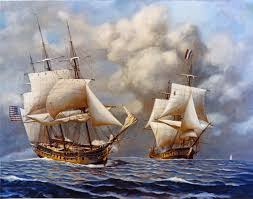
There have been times in every free nation’s existence when their freedom is put at stake. Freedom isn’t free and it can certainly be taken. When free countries are in their young years they are especially vulnerable to attack and subjugation by the more powerful among the nations. The United States had not been independent for even twenty years before their freedom on the high seas and their honor abroad was put at stake. There had been a regime change in France in 1794 and the new regime was not necessarily as friendly to the Americans as the old regime had been. This was largely due to the apathy that many Americans seemingly had towards the efforts of their fellow revolutionary French counterparts. Some Americans wanted to join the Revolution in France and support the French patriots. France had supported them in their revolution, had it not? But the American government was hesitant, and rightly so, to jump into another war, one which looked increasingly like it was evolving into a large European war. French hostility towards the United States was also due in part to the signing of the Jay Treaty between the United States and Great Britain. French privateers began to prey on vulnerable American merchant ships on the high seas. The American economy relied on commerce and trade, especially with Europe and the privateering and piracy of France was putting American trade with the Old World in danger. Also, American honor abroad was suffering as they were unable to protect their own merchant vessels.
Diplomatic relations between the two nations were cut when French ministers refused to admit American ambassadors to France. President John Adams refused a bribe from French ministers when they offered to restore diplomatic relations for a substantial sum of money. This became known as the XYZ Affair because Adams declined to name the shady French officials. In response to the French offer, Adams retorted that he would spend, “Millions for defense, not one cent for tribute.”
The United States had no substantial navy at the beginning of the conflict with France but this soon changed. In 1798 Congress rescinded treaties with the French and approved defensive measures on the high seas. Thus began the unofficial conflict which became known as the Quasi War. (Quasi means “almost”.) French and American ships clashed on the high seas. The Constitution defeated the French ships La Vengeance and L’Insurgente. The American ship Delaware captured La Croyable. The USS Enterprise captured eight French privateers and recaptured American merchant ships. The French ships Deux Amis and Diane fell to the USS Experiment. The American ship Boston defeated Le Berceau. The American marines raided a fort in Santo Domingo and American naval vessels recaptured and convoyed merchant ships all around the world.
The French and Americans agreed to an end of hostilities in September 1800. The Americans had secured commercial freedom on the high seas and had protected their merchantmen and their international honor. This conflict was the first conflict between the United States and a foreign power in American history and the Americans had proven that they were a force to be reckoned with.
